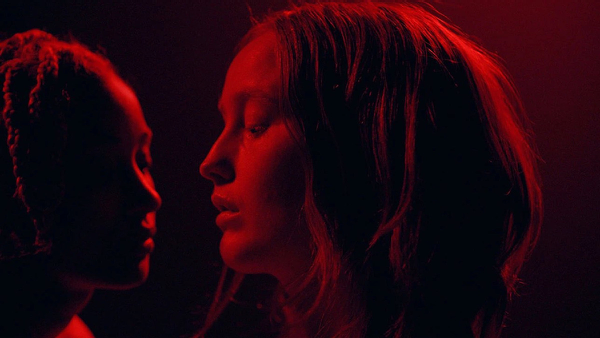Movie review by Greg Carlson
Filmmaker Jacqueline Castel’s “My Animal” premiered at the 2023 Sundance Film Festival in January, but its vibes are better suited to the rising blood moon of autumn’s spooky season. Now available on major streaming services following a brief theatrical run in select cinemas, Castel’s feature directorial debut is poised to scratch the itch of discerning horror hounds who appreciate slow-burn smarts as much as gory violence. The film’s modest budget and intellectual preoccupations limit the onscreen depictions of werewolf mayhem, but the sensitive bid for empathy and knockout performances by Bobbi Salvör Menuez and Amandla Stenberg make up for small narrative shortcomings.
Menuez’s Heather has reached adulthood but continues to live at home with both parents and younger twin siblings. Castel takes advantage of the well-worn, semi-rural Canadian setting (principal photography took place in the city of Timmins in northeastern Ontario) to outline Heather’s sense of stasis, yearning, and frustration. Patriarch Henry (the great veteran performer Stephen McHattie) runs a local diner and navigates a stormy marriage to alcoholic spouse Patti (Heidi von Palleske). Father and daughter have a special bond, but Castel hints that the out-of-sorts Patti also self-medicates to cope with some unspeakable trauma.
Soon enough, Castel lets us in on the contours of a curious routine: heavy chains and shackles secure Heather to a crimson-sheeted bed each time the moon is full. The members of the nuclear unit know and accept the situation, even if very little needs to be said out loud in reference to Heather’s lycanthropy. The silence extends (although that will change) to Heather’s queerness, another secret emphasizing otherness and outcast status in a world of conservative conformity and expectations that fulfill traditional gender roles. Actor Menuez identifies as trans and nonbinary, but Castel presents the character as femme, underlining the way hockey coach Dutch (Dean McDermott) initially refuses to consider Heather for a goaltender position on the men’s team.
The arrival of Stenberg’s beguiling figure skater Jonny sets Heather’s heart aflame. Stenberg, who also serves as one of the movie’s producers and contributes a song to the appealing, retro-styled soundtrack, brings a strong and sensual eroticism to the budding relationship – first in sultry and symbolic fantasies/dreams and later in a fragile and delicate reality fraught with dangers of several sorts. It seems easy and obvious to read Heather’s sapphic sexual awakening and the imperative to keep hidden the “curse” of werewolf transformation as parallels, but Castel – assisted by the chemistry of the actors – excels at drawing a deep connection despite a familiar conflict.
Like many young romances of novel and cinema, the emotional intimacy between Heather and Jonny is threatened by forces both large and small, internal and external. Castel shrewdly links Heather’s perspective and point of view directly to the viewer; the consuming fears and frustrations become ours as the story moves toward fuller revelations. The final sequences comment on mother-child bonds in a manner far more satisfying than the deliberately open-ended question of Jonny and Heather, though one can make an educated guess before the credits roll.
